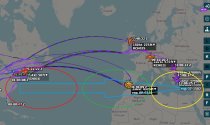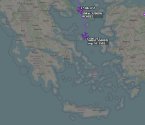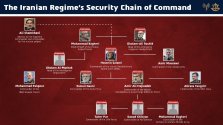Talk less, do more.
Replacement also killed lol
Replacement also killed lol
They can survive but can they shoot with full independence? Entry exit points are limited to underground facilities and they can be damaged to reduce the rate of launch. I believe that is partly what we could be seeing.They seem to be stopping more missiles than Isreal's AD have been, or did you forget you were just making the case for Israel's attempts?
Also, actually, underground facilities can actually be invincible to aerial attacks, they're not invincible overall as you can try infiltration or ground attacks, but against aerial attacks, if built deep enough, they can survive a direct nuke.
You must be really frustrated Iran is fighting this as a war and preserving forces, while your understanding of war is killing civilians and optics.
Not The CoS but chief of KhoA headquarters. They are responsible for the economic side of (military) things. Current CoS is Abdolrahim Mousavi, the previous head of Artesh.Talk less, do more.
Replacement also killed lol
IDF confirms killed Iran’s chief of staff in Tehran airstrike
Ali Shadmani, Iran’s wartime chief of staff and a top aide to Khamenei, was killed in a precision airstrike in central Tehran days after replacing previous top commander eliminated in Israel's first strikes
Talk less, do more.
Replacement also killed lol
IDF confirms killed Iran’s chief of staff in Tehran airstrike
Ali Shadmani, Iran’s wartime chief of staff and a top aide to Khamenei, was killed in a precision airstrike in central Tehran days after replacing previous top commander eliminated in Israel's first strikes
Iran has two separate armies that fight over budget despite being redundant. This ends up affecting Iran's own combat capability and military power. It would be better to integrate them into a single army to improve these deficiencies, but I highly doubt it because this is the very contradiction of the country's type of government.Okay so i had a possible theory, though quite far fetched for some of you.
So, i'm of the opinion that the Iranian Military is secretly collaborating with IDF in order to weaken the IRGC capabilities or even paved away a possible coup against the current Iranian administration.
I get this conclusion from the rather lack of activity does the Iranian Military currently positioned itself, especially with their S-300 ADS, and also noticed that much of the ADS systems that Israel have destroyed are mostly homegrown systems which usually went into the jurisdiction of the IRGC, and also not to mention that the IRGC are in control of most of the Iranian missile capabilities.
From my times where i usually hanged out on pro-Iranian forums, it can be stated that the rivalry between the Iranian Military and the IRGC is also the main contributing factor. There were times when they went into conflict over arms procurement, especially the S-300 and later on T-90 tanks. And not to mention the favoritism towards IRGC within the Iranian structure, so it is not far fetched that the Iranian military felt very bitter towards them.
I have a feeling that this collaboration has been a thing since the assassination of Hamas leader Haniyeh and later on the exact position of Hezbollah leadership.
So yeah in my opinion, the Iranian Mossad mole this entire is the Iranian Military, from sabotaging the IRGC assets to even giving a possible way for Israeli aircrafts in navigating from Iran's own IADS which is spread out throughout the country.
This is so far only my hypothesis and borders on the periphery of off-topic but i would like to stressed out that the rivalry between the Iranian Military and the IRGC is also a contributing factor within this current conflict.
What are the chances US join in? They did all the preparation work, from air lift to rebasing fighters. The political class is giving mixed messages but I tend to believe action speaks louder.



Regime change is unlikely without a ground invasion.

Iran's biggest move would be waiting for the best time (when as many forces are concentrated in the Gulf as possible) to close the Straits of Hormuz through mining and striking all hostile naval ships and bases inside the constrained Gulf from short range with ASMs, attack boats, mini-subs and USVs.
This would inflict immediate damage and provoke a ground war.
Saudi Arabia and other Gulf states have imposed a ban on US warplanes using their air fields or skies to attack Iran after US President Donald Trump over the weekend threatened to bomb the country.
Saudi Arabia, the UAE, Qatar and Kuwait have all told the US they will not permit their airspaces or territories to be used as a launchpad against Iran, including for refuelling and rescue operations, a senior US official told Middle East Eye.
They need to have the will to fight to the end though and accept that they will become a war torn nation for 10+ years no matter what at this point.
Neither will Trump survive an extended war .His base hates wars and the Republicans will lose the mid terms.Not only were the , but they claim to have , including the Iranian military's chief of staff; the commanders of the IRGC, Quds Force and IRGC Aerospace Force; and also the seniormost officers of not only IRGC intelligence and Quds Force intelligence, but also the overall head of Iranian military intelligence.
View attachment 154637
Certain Israeli claims announcing the attrition of HVTs can turnout premature in some instances due to the fog of war, but Iranian civilian leadership and state media have these not so insignificant martyrdoms.
The ongoing Israeli military campaign against Iran — regardless of what the US ultimately adds to the equation — most likely isn't going to convince the Iranians to draw up a new constitution or to return a Pahlavi to the throne. The Trump administration is deeply wary of "forever wars," so there's no appetite for deploying significant boots on the ground for physically dismantling the current Iranian regime.
Even absent a ground invasion, significant further decimation of senior Iranian leadership could make way for the rise of leaders who may be granted the mandate for redefining Iran's national political equilibrium in the wake of a seeming existential crisis, if not what some may come to see as a historical humiliation should Tehran acquiesce to Trump's idea of a "good deal."
Escalating towards such a broader regional conflict will earn Iran the enmity of the neighboring Gulf sheikhdoms, which are right now positioned and incentivized to actively discourage or at least delay direct US strikes against Iran.
While there's plenty of historical bad blood between Sunni Arabs and Shiite Persians, unlike Israel, sheikhdoms like Qatar and the Emirates literally sit across the water from Iran, and they don't want to see what is basically their backyard engulfed by the flames of war.
In fact, the Emirates, Qatar and Kuwait, which all host thousands of DoD personnel and significant USAF infrastructure, as well as Saudi Arabia, which has welcomed an USAF Air Expeditionary Wing on a nominally temporary basis since at least the late 2010s, :
There's obviously a reasonable chance that these sheikhdoms will ultimately bend to American pressure and allow USAF birds striking Iran to takeoff from their airbases, especially given that tankers and ISR platforms based in these states may already be contributing to ongoing IAF missions against Iran.
OTOH, a lack of adequate access to regional airbases may give Trump second thoughts on the feasibility of a triumphant air campaign against Iran, and delay direct US entry into the conflict, at least until "deals" can be negotiated.
Iran and Iraq fought a brutal war that lasted for almost the entirety of the 1980s which left hundreds of thousands dead on boths sides, so the Iranian public probably might have the stomach for a broad and extended conflict.
However, the likelihood that the current Iranian regime will survive a decade+ hot war against the US isn't high either.
